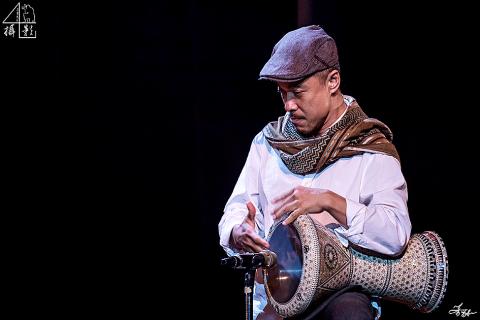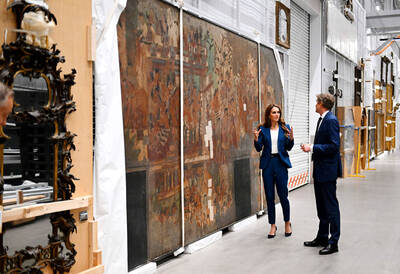Spirited drumbeats from the Middle East will come alive this month at three performances by musician Ma Chun-jen (馬?人) to promote the launch of his new book, Essential Guidebook of Rhythmic Intelligence Beyond Middle Eastern Music and Dance (中東樂舞節奏聖典).
Ma, a former war reporter, first set foot in the Middle East in the summer of 1996, at the height of the Iraqi Kurdish Civil War. He was on his way back from the battlefield one day when he heard the sounds of music and singing drifting from the Tigris River.
Journalism brought Ma back to the Middle East several more times. But amid violent conflict, it was his discovery of musical traditions that inspired a deeper engagement with the region.

Photo courtesy of Ma Chun-jen
Since 2007, Ma has traveled through Egypt, Iran, Iraq, Syria, Tunisia, Turkey and other Middle Eastern countries to study percussion. In Essential Guidebook, he translates those experiences into the first Chinese-language book about Middle Eastern musical and dance rhythms.
These rhythms are moving, complex and culturally unique. Aside from being a technical guide to musical theory and instruments such as the goblet-shaped doumbek and tar frame drum, Essential Guidebook also discusses the development of Middle Eastern musical and dance rhyhms from an anthropological perspective.
Over the next three Saturdays in Taipei, Ma will combine his book promotions with rare live performances. Tomorrow’s event is at the Art Focus Salon (新月藝文沙龍) while the event on August 17 is at Cafe Doux (敦南朵爾). Both have a registration fee of NT$100.
On August 24, Ma will join forces with French musician Alban Coueffe, who plays a lute instrument called the oud, at the Art Reading Cafe (青田藝集). The registration fee is NT$150.
■ Tomorrow, 4pm at Art Focus Salon (新月藝文沙龍), 25, Tianjin St, Taipei City (台北市天津街25號). Register at: pse.is/KRMRE
■ August 17, 4pm at Cafe Doux (敦南朵爾), 13, Lane 63, Dunhua S Rd Sec 2, Taipei City (台北市敦化南路二段63巷13號). Register at:forms.gle/rjxZ2o8Jo7HGfLtq6
■ August 24, 3pm at Art Reading Cafe (青田藝集), 4-1, Qingtian St, Taipei City (台北市青田街4-1號). Register at: reurl.cc/EAYNa

June 9 to June 15 A photo of two men riding trendy high-wheel Penny-Farthing bicycles past a Qing Dynasty gate aptly captures the essence of Taipei in 1897 — a newly colonized city on the cusp of great change. The Japanese began making significant modifications to the cityscape in 1899, tearing down Qing-era structures, widening boulevards and installing Western-style infrastructure and buildings. The photographer, Minosuke Imamura, only spent a year in Taiwan as a cartographer for the governor-general’s office, but he left behind a treasure trove of 130 images showing life at the onset of Japanese rule, spanning July 1897 to

One of the most important gripes that Taiwanese have about the Democratic Progressive Party (DPP) is that it has failed to deliver concretely on higher wages, housing prices and other bread-and-butter issues. The parallel complaint is that the DPP cares only about glamor issues, such as removing markers of Chinese Nationalist Party (KMT) colonialism by renaming them, or what the KMT codes as “de-Sinification.” Once again, as a critical election looms, the DPP is presenting evidence for that charge. The KMT was quick to jump on the recent proposal of the Ministry of the Interior (MOI) to rename roads that symbolize

On the evening of June 1, Control Yuan Secretary-General Lee Chun-yi (李俊俋) apologized and resigned in disgrace. His crime was instructing his driver to use a Control Yuan vehicle to transport his dog to a pet grooming salon. The Control Yuan is the government branch that investigates, audits and impeaches government officials for, among other things, misuse of government funds, so his misuse of a government vehicle was highly inappropriate. If this story were told to anyone living in the golden era of swaggering gangsters, flashy nouveau riche businessmen, and corrupt “black gold” politics of the 1980s and 1990s, they would have laughed.

Imagine being able to visit a museum and examine up close thousand-year-old pottery, revel alone in jewelry from centuries past, or peer inside a Versace bag. Now London’s V&A has launched a revolutionary new exhibition space, where visitors can choose from some 250,000 objects, order something they want to spend time looking at and have it delivered to a room for a private viewing. Most museums have thousands of precious and historic items hidden away in their stores, which the public never gets to see or enjoy. But the V&A Storehouse, which opened on May 31 in a converted warehouse, has come up